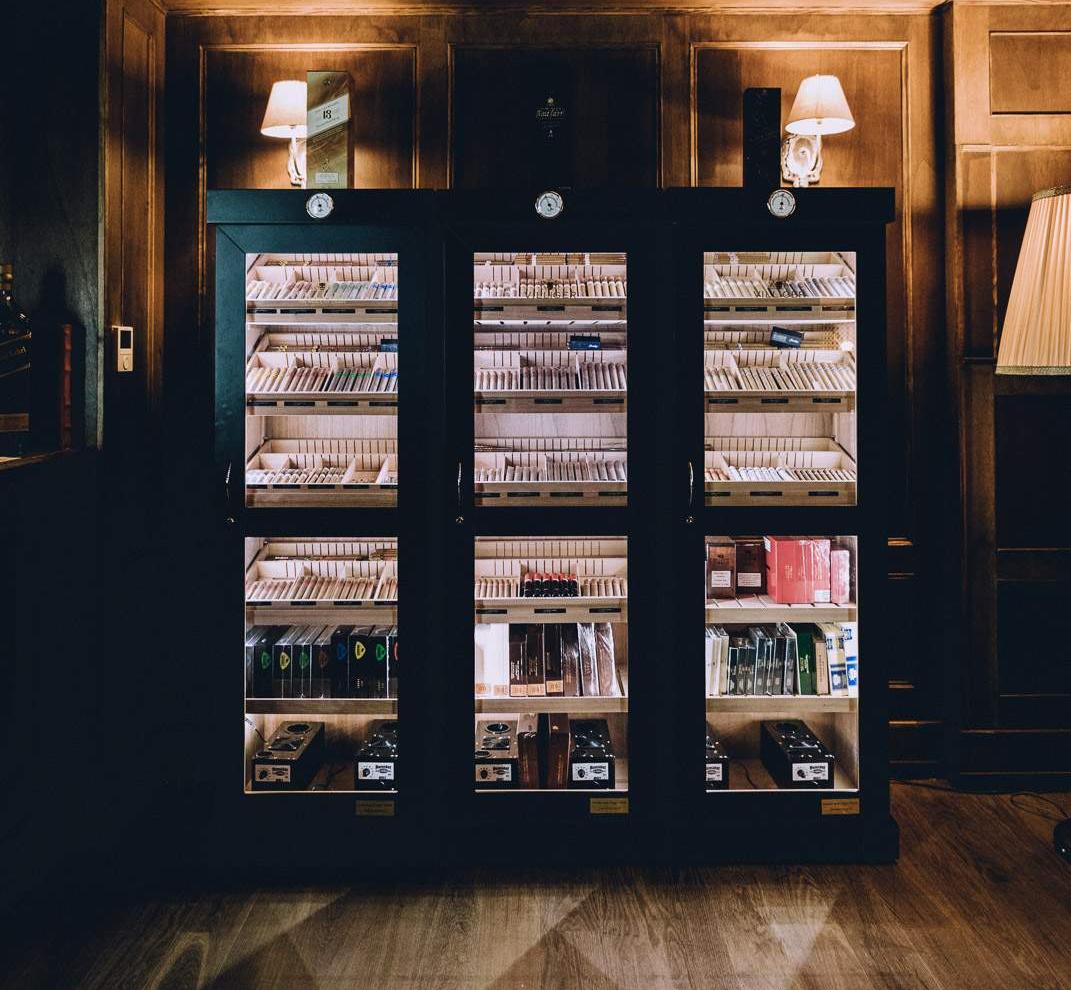The way you store your cigars can either improve or ruin the smoking experience. Find out why the correct storage of cigars is crucial, what you should keep in mind, and how you may still be able to save dried-out cigars.
Until the 1980s, cigar experts recommended storing cigars at a humidity of 65% to 75% and a temperature of 22℃ to 25℃. While the recommended humidity has changed little at around 70%, the optimal temperature has dropped to 20℃ to 22℃. But why are humidity and temperature so crucial for cigar storage?
Cigar storage: temperature and humidity are critical
The correct temperature and humidity are extremely important for the enjoyable cigar because cigars lose quality quickly if stored incorrectly. So, storing cigars correctly not only saves cigars’ lives it also saves you a great deal of money. If cigars are stored at a humidity of over 72%, they begin to sweat, and the wrapper gets an oily sheen. Moreover, such cigars might expand, forcing the thin wrapper to break. Worst case, mold may form. But even without mold, over-humidified cigars burn more slowly, and you have to correct the burn more often and, possibly, re-light. Likewise, over-humidified cigars develop an unpleasant taste.
Under-humidified cigars, on the other hand, burn faster, become porous, and crack more easily. Moreover, cigars that are too dry burn hot, destroying the flavors. Cigar experts know that just a day or two of rest in a humidor can make a huge difference. One to two weeks, months, or years even, can do wonders. The reason being that cigars lose their “barnyard aromas,” sharpness, and often draw-issues. Storing tobacco correctly not only eliminates undesirable odors, but the wood of a humidor can also have a positive effect on the bouquet of a cigar.

Humidors – wine cellars for cigars
A cigar’s taste is best preserved in a slightly tropical climate, namely, a humidity of around 70%. Because it allows the moisture in the cigar to reach an optimal value of around 13% of the net weight. Humidity and temperature are responsible for this optimum moisture content of 12% to 14%. The temperature should be approximately 20℃.
Aficionadas and aficionados store their favorite cigars in a humidor to ensure this optimum temperature and humidity. Most of these “wine cellars” for cigars are made of wood. Portable humidors can also be made of aluminum or plastic. The intense flavor of Cuban cigars, in particular, can affect the taste of other cigars. So, store those fine cigars in the humidor on separate shelves or separate them using dividers. Some aficionadas and aficionados prefer separating their cigar collection using dividers, namely, small pieces of wood that can be variably installed inside the humidor. Doing so allows you to sort your cigars according to age, brand, line, wrapper, strength, or country of origin. You can use a hygrometer to constantly monitor the humidity and self-regulating systems to ensure the humidor's optimum humidity and temperature. The solid wooden chest not only protects its contents from climate impacts and physical damage but also from pests like the tobacco beetle.
If you’re unsure what size humidor you should buy, Cigar experts generally advise going bigger rather than smaller, as there should always be sufficient ventilation in the humidor. Ultimately, a humidor will only store your cigars as well as you take care of it.
Spanish cedar – the wood from which real humidors are made
Spanish cedar is the most suitable wood for humidors. However, this term is somewhat misleading since the wood does not originate from Spain and is not from the cedar family. The real cedar is a coniferous tree that has a powerful, albeit unpleasant, scent. It would be strong enough to mask the aromas of a cigar.
The Spanish cedar, on the other hand, comes from the Cedrela species, deciduous trees with pinnate leaves. The trees belong to the mahogany family and grow in West and South America. The established trade name is Cedro. However, there are different varieties depending on the origin. Spanish cedar has the unique ability to bring out the best in the cigars’ aroma without masking the tobacco’s aroma.
Tips and tricks for storing cigars
Following these explanations and ground rules for storing cigars correctly, we would like to share a few more tips and tricks:
- Do not store your conventional cigars in a humidor together with flavored cigars or even pipe tobacco. They will pass the flavorings to the traditional cigars.
- Humidipaks are a simple way to control humidity. They are suitable for short trips or storage of several cigars for a maximum of 30 days. Moreover, they are available in different humidity levels to ensure a consistent humidor climate.
- Be careful not to turn the heating in the room where you keep your humidor fully on in winter and keep your humidor in the shade in summer.
- The emptier the humidor, the more difficult it is to maintain the climate. So, suppose you enjoy a cigar regularly. In that case, you should also buy cigars periodically and keep an eye on the climate in the humidor.
No humidor? There are (stopgap) solutions
If you don’t own a humidor (yet), you should store your cigars in a dark room if possible. However, the basement is not suitable since underground rooms usually smell musty, and even boxed cigars quickly absorb the flavor of the things around them.
Storage rooms are more suitable, but only if they are not being used for storing odorous goods like herbs and spices or cleaning agents. A crucial aspect of storing cigars without a humidor: Never leave the cigars lying on the shelf. Instead, keep them protected from external influences. It is best to leave the cigars in their cellophane wrapper – but cut the packaging slightly on one side. Doing so will help your cigar to maintain its humidity and avoid “sweating.”
If you don’t have a suitable storage room and you’re in a pinch, you can also put your cigars in a wooden drawer. To achieve sufficient humidity, pack the cigars in a plastic bag and place it on a damp kitchen towel.

Saving dried-out cigars
A simple trick allows you to find out whether a cigar is too damp or too dry: gently press the foot of the cigar between your thumb and index finger. If the cigar yields easily without cracking, that is a good sign. The wrapper should feel silky and have a light shine. Suppose you stored a cigar, and it has become too dry. In that case, you can try to restore it to its original condition by storing it in the humidor for a longer period. Make sure that you maintain the designated humidity of around 70% – because humidity cannot compensate for excessive dryness.
There is another simple way to restore dry cigars, especially if you don’t have a humidor on hand. However, this requires some patience and skill. Put the open cigar box and a glass of water in a bag made of polyethylene, i.e., a thermoplastic, and close it almost completely. Leave a small opening for air exchange. You should rearrange and rotate the cigars every few days until they are hopefully smokable again after about three weeks. Bear in mind that the cigars inevitably lose some of their aroma and can no longer be compared with properly stored cigars.
Storing cigars – how to avoid common mistakes
Let’s clear up the following two persistent rumors about cigar storage:
- Storage in the fridge or freezer: Cigars stored in a fridge would dry out and fail the pinch test after a while. A freezer would do even more damage. The reason being that once they thaw, the cigars get mushy and are only suitable as fertilizer for flowers.
- When the temperature drops, the humidity has to be increased: Physics thwarted these arithmetic exercises. The chemical structures of tobacco, combined with the physical processes involved in water vapor formation, mean that the tobacco no longer absorbs water above a specific humidity percentage.
By contrast, storing cigars correctly is like storing an excellent red wine – the taste intensifies over time.